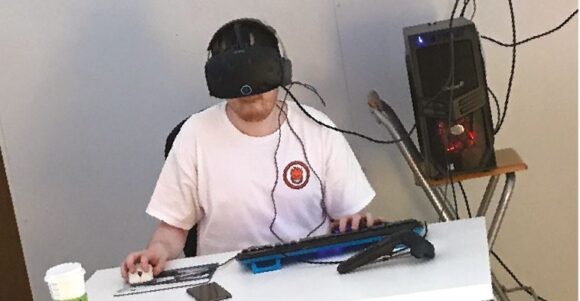SOMEONE WAS WALKING along the street when they saw black smoke billowing from a house window. Instinctively they whipped out their phone. They took a photo, and uploaded it to their social media platform as they walked on.
It happened that the secretary of the house’s landlord was cruising social media at the time. She saw the post, recognised the house and called the emergency services, who arrived and put the fire out.
Life on Screen
An increasing proportion of the world’s population is spending an increasing proportion of their time looking at screens— for work, for play and for conducting day-to-day life. For some this is a cause for concern. There has been relatively little research into the potential hazards of prolonged exposure to electric and magnetic fields, the physiological risks associated with spending long periods in restricted postures making repetitive hand movements, and the strain on the visual system caused by staring at a small backlit screen. We were designed to lead active outdoor lives, and most people agree that we would be physically and mentally healthier if we spent less time on devices.
Another cause for concern is the peculiar fact that we appear to be shifting our focus away from reality. It seems that the person who saw the fire was so engaged in their online world that they had forgotten how to respond to a real-life situation. Most people would agree that virtual reality is a poor substitute for living in the present.
Interestingly, the Bible presents to us another alternative reality—and it urges us to live in it! These are words of the Apostle Paul: “We do not look at the things which are seen, but at the things which are not seen. For the things which are seen are temporary, but the things which are not seen are eternal” (2 Corinthians 4:18).
What does he mean by ‘eternal things’? The answer is in Hebrews chapter 11. This is sometimes called the ‘faith chapter’, because it’s a catalogue of great people in the Bible who were characterised by a particular way of thinking. They looked beyond the present world. There was Abraham (v. 8) who left his comfortable life in the sophisticated city of Ur, to go wandering in the outback of Canaan.
These all died in faith, not having received the promises, but having seen them afar off were assured of them, embraced them and confessed that they were strangers and pilgrims on the earth. For those who say such things declare plainly that they seek a homeland (vs. 13–14).
That ‘homeland’ is the Kingdom of God, which is to be established at Christ’s return—the goal of all godly people throughout the ages.
Jesus Christ urges us to get our lives into perspective: “Therefore do not worry, saying, ‘What shall we eat?’ or ‘What shall we drink?’ or ‘What shall we wear?’ For after all these things the Gentiles seek. For your heavenly Father knows that you need all these things. But seek first the kingdom of God and His righteousness, and all these things shall be added to you” (Matthew 6:31–33).
Followers of Christ have their lives in perspective. They realise that this present life, with all its excitement and pleasures and dangers and difficulties, is only temporary. What really matters is the eternal life which God has promised to those who come to Him. And because their desire is focused on that wonderful time when God’s glory will fill the earth (Habakkuk 2:14), it’s natural that they want to live their lives now in a way that gives glory to God. This is what it means to “seek first the kingdom of God and His righteousness”.
How do you cultivate this new perspective on life? Of course it’s by reading God’s Word the Bible, which tells us all we need to know about the Kingdom which is coming and the kind of people who will inherit it.
Degrees of Reality
There is life onscreen, which is exciting and absorbing and easy. It’s tailored to our desires and convenience—as you’d expect, because it’s largely created by people who want stuff from us (either our money or other things). Then there’s real life—the wide vibrant world which we experience with all our senses, where we interact with other people and operate in the way for which we were designed. It’s a beautiful world, but it’s flawed: life can be painful, difficult and unfulfilling. Then there’s eternal life—the life of God’s Kingdom. We don’t literally possess eternal life now: that will be a gift for those who have been faithful, when Christ returns and when “this corruptible has put on incorruption, and this mortal has put on immortality” (1 Corinthians 15:54). It is a gift which will be given to those who have shown they want it, by trying now to live the life of the Kingdom—those who “walk by faith, not by sight” (2 Corinthians 5:7).


